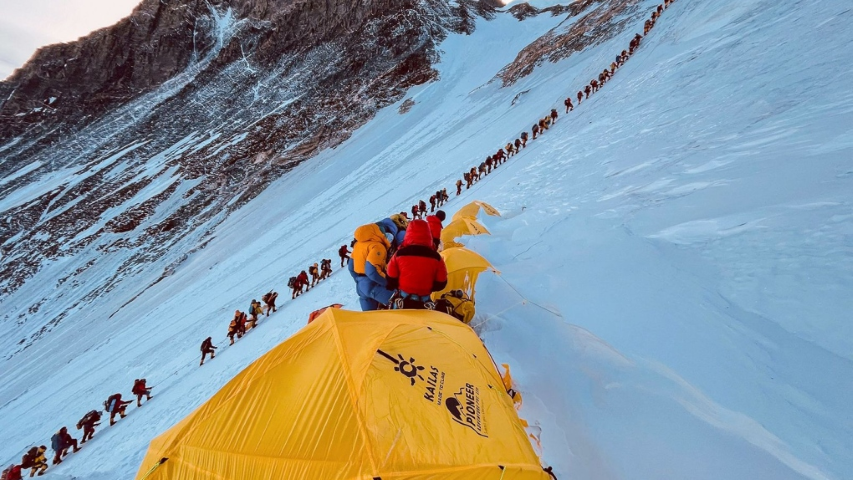
In a snapshot captured in 2021, a group of climbers is seen in a line ascending a slope on their journey to conquer the peak of Mount Everest. (Lakpa Sherpa/AFP/Getty Images)
In preparation for the upcoming 2024 Mount Everest climbing season, Nepal has introduced a pivotal new mandate, shrouded in mystery and anticipation, set to alter the landscape of the world's highest peak. The decree dictates that all climbers embarking on the formidable journey must equip themselves with tracking chips, a requirement aimed at revolutionizing safety measures on the treacherous slopes of Everest.
Rakesh Gurung, the esteemed director of Nepal's Department of Tourism, disclosed to CNN the gravity of this mandate, highlighting its potential to significantly diminish search and rescue efforts in the event of mishaps amidst the unforgiving terrain. These tracking chips, a beacon of hope for climbers and authorities alike, are slated to become an indispensable lifeline, weaving through the perilous labyrinth of Everest's peaks and valleys.
The financial burden of this safety initiative falls upon the climbers, who will be obliged to procure these tracking chips at a cost ranging from US$10 to US$15 apiece. Once in possession, these chips will be delicately sewn into the fabric of their jackets, embarking on a journey that transcends the physical realm, tethering them to satellites via the intricate web of the Global Positioning System (GPS).
However, the veil of secrecy surrounding these chips deepens, as Gurung veils the origin and manufacturers behind these pivotal devices in an aura of mystery, merely divulging that they hail from "a European country." With the stakes at their highest and the climbers' fates hanging in the balance, the spotlight shifts to the impending Everest season, poised on the cusp of transformation.
Nepal, home to eight of the world's ten highest peaks, including the formidable Mount Everest, stands as a beacon for mountaineers, drawing adventurers from across the globe to its majestic summits. However, with great adventure comes great risk, as evidenced by the arduous journey and staggering costs associated with tackling Everest's formidable slopes.
As the world braces for the spectacle of the Everest season, shrouded in anticipation and trepidation, the echoes of last year's tragedies linger in the minds of climbers and authorities alike. A record number of climbing permits were issued, yet the mountain claimed its toll, with fatalities and disappearances casting a sombre shadow over the towering peaks.
Against this backdrop of peril and uncertainty, the introduction of tracking chips emerges as a beacon of hope, a testament to Nepal's unwavering commitment to safeguarding the lives of those who dare to challenge the roof of the world.















